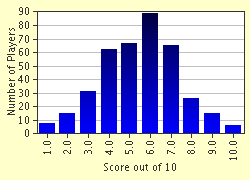Quiz Answer Key and Fun Facts
1. Political legitimacy is an important aspect of every regime's rule. Legitimacy refers to a particular regime's need to justify the propriety of its rule vis-à-vis its subjects. Max Weber described three basic forms of legitimacy. Which of the following was not a pattern by which a regime may attain legitimacy for its authority according to Weber?
2. A confederal system involves a great deal of autonomy for member states, including the right of secession. Which of these nation-states claims to be a confederation?
3. Conflict can occur in many different forms within nation-states and societies across the globe. One such example is conflict based on ethnicity. In the mid-1990s an ethnic conflict between the Hutus and Tutsis occurred in which of these countries?
4. Conflicts that are nationalist involve minority groups within nation-states that seek a sovereign nation separate from the nation-state within which they currently reside. Which of these minority groups has sought an autonomous state within the boundaries of Spain?
5. Typically, ethnic conflict only occurs in countries where there are substantial ethnic minority groups. Which of these countries is not considered to be largely ethnically homogeneous?
6. One of the leading political ideologies of the past several centuries has been that of liberalism. In short, liberalism promotes the ideas of maximum freedom of choice and minimal government involvement in the lives of citizens. Which of these famous political theorists was a proponent of the liberal philosophy?
7. Social Democracy is another popular political ideology, one largely developed in the 20th century. Which of these countries adopted social democracy as its chief political ideology in the latter part of the 20th century?
8. Communism was another of several popular ideologies that has been employed by governments in the 20th century. In the late 1980s, early 1990s communism largely collapsed around the world. Following the shedding of the communist ideology in the Soviet Union in 1991, which subsequently broke apart into its constituent republics, the government of which one of these countries continued to adhere to communist ideology?
9. Theories abound regarding how the modern concept of the nation-state was developed (complete with the development of modern nationalism). Which of these political theorists developed the concept of 'imagined communities' to explain the rise of modern nationalism?
10. Another theoretician who has taken part in the debate about the development of nationalism throughout the world is E. J. Hobsbawm. Which of these phrases is associated with Hobsbawm's work?
Source: Author
thejazzkickazz
This quiz was reviewed by our editing team before going online.
Any errors found in FunTrivia content are routinely corrected through our feedback system.

